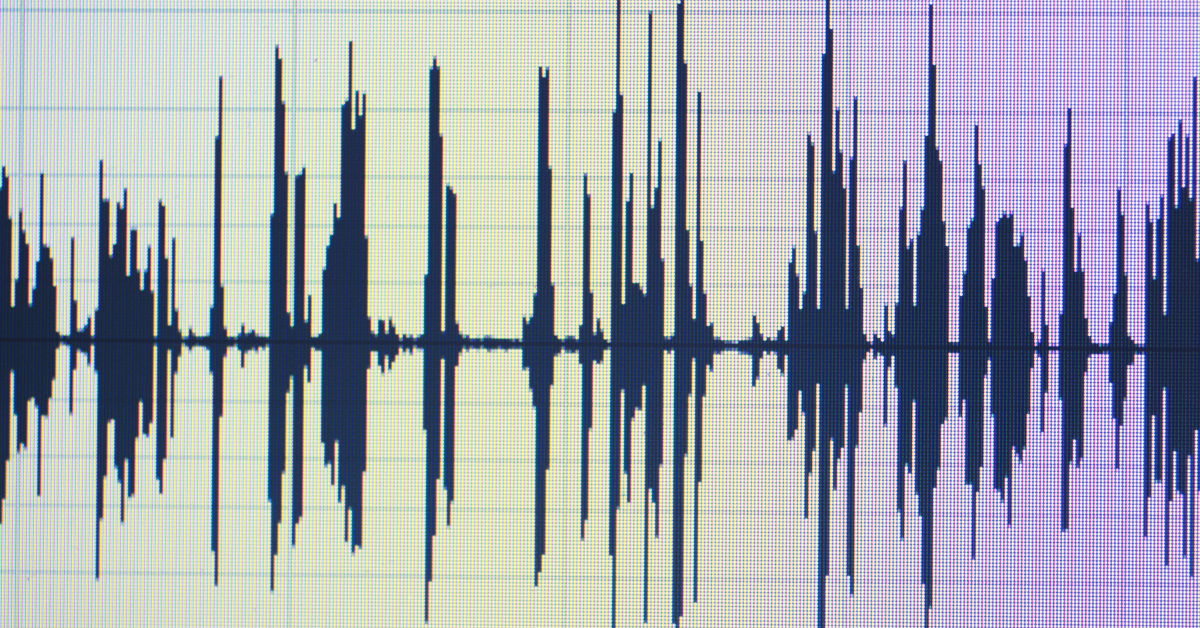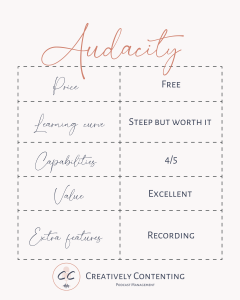Editing is one of the things that new podcasters often struggle with. Maybe you can relate. Learning to edit takes time and you don’t want to waste time learning to use a software only to find out that it doesn’t tick all the boxes. That’s what I’ve put together this post about the best free and paid podcast editing software.
Before you go signing up for podcast editing courses I would highly recommend doing your research into what podcast editing software best suits your needs. And good news, you’re at a good place to start.
Editing a podcast takes place after the podcast is recorded. To read more about how to record your podcast see our post on the best recording software for podcasts and our post comparing the best podcast mics.
Why do you need to edit a podcast?
Editing a podcast is what takes it from being something like a Whatsapp voice note, to being a fully produced, more professional sounding episode.
When you edit a podcast you will usually do the following:
- Top and tail it, meaning you cut any extra recording from the beginning and end
- Reduce background noise
- Cut out filler words such as “umm” or “you know”
- Equalise the sound- adjusting the frequencies for a better listener experience
- Cut out or reduce silences and long pauses
- Add an intro and outro
- Add music
- Add any advertisements or call to actions
This will make your podcast more appealing to your target audience. You can edit a podcast in different ways and there are free and paid podcast editing software.
Different kinds of podcast editing software
When editing your podcast you might visualise an editing software with the different tracks and soundwaves, like the picture below. But did you know that now that isn’t the only way to edit audio?
Now there is some software where you can edit using the transcript. What this looks like is the software will transcribe your audio and then you will read through the transcript and cut out anything you don’t want in there. This can be a really convenient option for people who just don’t have the time to spend learning to edit the other way.
The Best Free Podcast Editing Software
Audacity
Audacity is a free, open-source audio editor that is widely used for podcasting. This is what I usually recommend to anyone starting a podcast. It offers a range of features, including noise reduction, EQ, and compression.
Audacity can look intimidating on first look and does take some time to get used to for someone who has never edited before but once you get used to it it really is a powerful tool with way more features than you would expect from a free software.
My favourite features are the “truncate silence” feature which gets rid of all long pauses and silences automatically and the “noise gate” feature which just makes your audio sound better.

Garageband- podcast editing software for Mac
Garageband is a free audio editing software that comes pre-installed on all Macs. It is a user-friendly option that offers virtual instruments and a range of audio effects. Garageband is an excellent choice for those new to podcasting and need a simple tool to get started.
There are a lot of extra features on GarageBand that you likely won’t use for podcast editing so don’t let them overwhelm you.
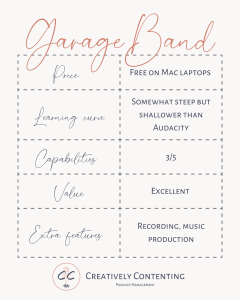
The Best Paid Podcast Editing Software
Descript
Descript is a unique podcast editor that uses artificial intelligence to transcribe your audio and turn it into text. With Descript, you can easily edit your podcast by simply editing the text as if you are editing a document and it will automatically apply this to your audio. You can cut out unwanted parts, add or remove music, and even insert audio from other sources.
One of the most impressive features of Descript is its ability to generate a realistic-sounding voice using text-to-speech technology. This means that you can create voiceovers for your podcast without needing to record anything. Descript also offers collaboration features, so you can work with others to edit your podcast.
Descript is an excellent option for someone who has never edited before and doesn’t want to invest much time into it. I find that you have less options to optimise the audio and improve the sound quality but you could run your audio through something like Audyllic after you’ve finished editing on Descript.
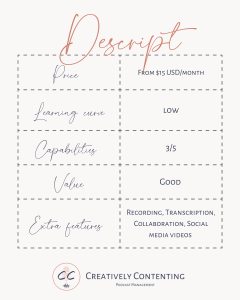
Hindenburg Journalist
Hindenburg Journalist is a premium audio editing software designed specifically for journalists and podcasters. It offers advanced features, such as automated EQ and compression, to enhance sound quality. It also includes built-in audio processing presets to improve the overall sound of your podcast.
Hindenburg offers a Lite option, which involves a one off cost or the Pro version with a monthly subscription.
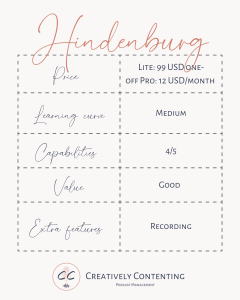
Adobe Audition
Adobe Audition is a comprehensive audio editing software that offers a wide range of features, including noise reduction, audio restoration, and multi-track editing. It integrates seamlessly with other Adobe products, such as Premiere Pro, making it an excellent choice for podcasters who are also into video editing.
Audition is one of the most commonly used audio editing softwares so if you work with an agency or collaborate on work with someone else in the industry you will likely use this.
Similar to Audacity it can take getting used to because there are just so many features and options. But once you get over the initial learning curve and get into it you should be able to work pretty quickly.
Adobe Audition is part of the Creative Cloud suite so if you already use any of the other software you might already have access.
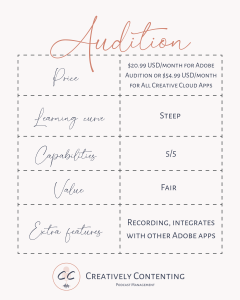
Pro Tools
Pro Tools is a professional-grade audio editing software widely used in the music and audio industry. It offers advanced editing capabilities, such as multi-track editing and mixing, and a range of audio effects and virtual instruments. It is a top-of-the-line editing software that is perfect for professional podcasters who need high-end editing features.
Like GarageBand Pro Tools is also a music production software so will have a lot of features you might not need for podcasting.
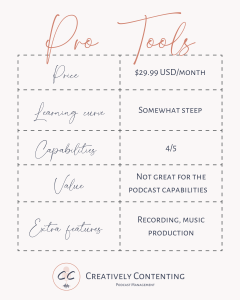
Reaper
Reaper is a low-cost audio editing software that offers a range of advanced features, such as multi-track editing and mixing, noise reduction, and audio restoration. It is a cost-effective option that is perfect for podcasters who are on a budget.
This is a very powerful software with optional extensions available. Again it is a music production software so you will likely not use a lot of the features. A benefit of Reaper is that some of the music production features don’t come automatically installed so you won’t have to worry about them taking up too much space.
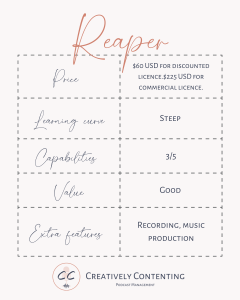
Read next:
Starting a new podcast? Download my free podcast workbook.
Want to chat? Contact us!

